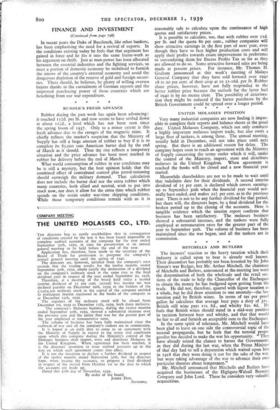RUBBER'S FRESH ADVANCE
Rubber during the past week has again been advancing : it touched 1Iid. per lb. and now seems to have settled down at about II id., a level which has not been seen since the spring boom of 1937. Only to a minor extent is this fresh advance due to the ravages of the magnetic mine. It chiefly reflects the market's suspicion that the Ministry of Supply has still a large amount of rubber to buy if it is to complete its 85,000 tons American barter deal by the end of March as it should. Thus the rise reflects a temporary situation and the price advance has been most marked in rubber for delivery before the end of March.
What world consumption of rubber in war conditions may be is still a mystery, but the best opinion holds that the combined effect of contraband control plus petrol-rationing should outweigh the military demand. That calculation does not include the barter deal nor the extra rubber which many countries, both allied and neutral, wish to put into stock now, nor does it allow for the extra time which rubber spends on the ocean under war-time shipping conditions. While those temporary conditions remain with us it is reasonably safe to calculate upon the continuance of high quotas and satisfactory prices. It is possible to calculate, too, that with rubber over iid. per lb. and the quota 8o per cent., rubber companies will show attractive earnings in the first part of next year, even though they have to face higher production costs and will apply their profits towards estate improvement in preference to surrendering them for Excess Profits Tax so far as they are allowed to do so. Some attractive forward sales are being made at present prices. For instance, Mr. Thomas H. Graham announced at this week's meeting of Malaya General Company that they have sold forward over 1940 18 to 20 per cent. of their crop at 10 1-16d. per lb. Rubber share prices, however, have not fully responded to the better rubber price because the outlook for the latter half of 1940 is by no means clear. The possibility of deteriora- tion then might be reduced if the barter purchases by the British Government could be spread over a longer period.












































 Previous page
Previous page